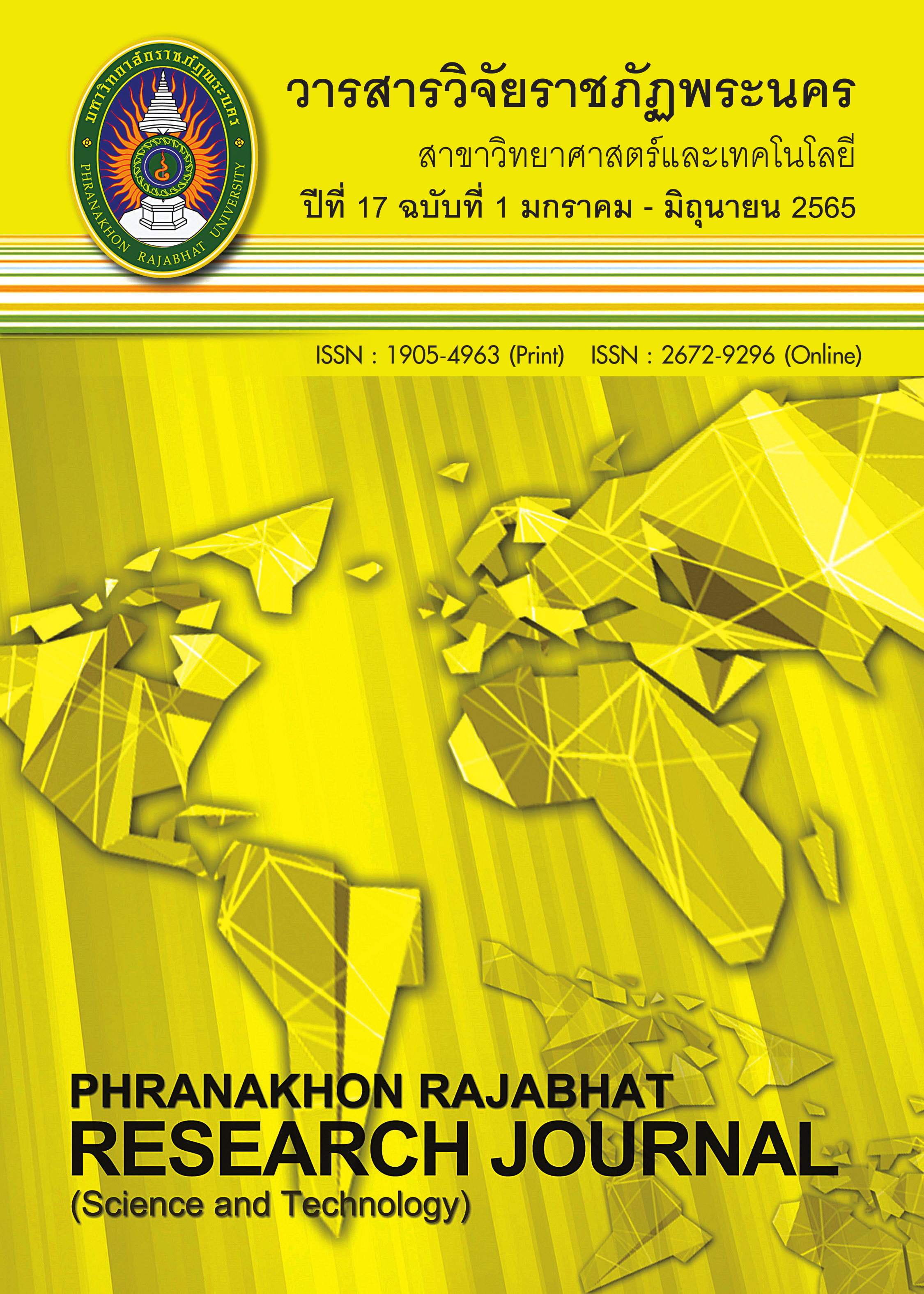STATUS AND CHARACTERIZATION OF MUNICIPAL SOLID WASTE: THE CASE OF POOCHAOSAMINGPRAI MUNICIPALITY, PHRA PRADAENG DISTRICT, SAMUT PRAKAN PROVINCE
Keywords:
Solid waste composition, Municipal Solid Waste, Solid Waste ManagementAbstract
Lack of Municipal Solid Waste (MSW) sorting coupled with non-sanitary disposal causes not only effects on the environment and human health but also a current management problem for local authorities. Sustainable and proper management of the problem according to types of the MSW is important. This research aimed to evaluate sources, generation rate, and types of the MSW and to study current situation of MSW management in Poochaosamingprai Municipality during September 2020 to April 2021. The results indicated that approximately 99% of collected MSW from this area was disposed by Controlled Open Dump. The source identification revealed that this MSW was generated from communities (76.49%), fresh-food markets (1.70%), schools (0.79%), temples (1.77%), industrial sector (16.04%) and non-industrial establishments (3.21%). If MSW separation at source was implemented properly, the estimated generation rate would be 1.48±0.08 kg per capita per day. Moreover, the highest proportion of the MSW from all sources was organic waste (51.44±0.85%), followed by general waste (39.75±3.95%), recycle waste (8.69±3.09%) and hazardous waste (0.12±0.20%), respectively. In the future, therefore, studies should focus on alternative waste management technologies for each type of MSW, for example composting or biogas production for organic waste and Refuse-derived fuel (RDF) for general waste, which can contribute to the proper and sustainable management of MSW
References
Department of Alternative Energy Development and Efficiency. (2005). Study and demonstration of electric power/heat production from community waste. Retrieved from http:// webkc.dede.go.th/testmax/node/2482 [2021, 10 May.]
Jitpranee, S., & Ladpala, S. (2009). Feasibility study of organic waste management for biogas production in Naresuan University. Industrial Technology Lampang Rajabhat University Journal, 2(1), 37-43. (in Thai)
Joshi, N., Khatri, S., Tomar, R.K, & Jain, S.K. (2015). Greenhouse gas emissions in present and proposed municipal solid waste management plans and technologies in India: a comparative analysis of CO2 equivalent emissions from centralized and decentralized municipal solid waste management.
Journal of Civil Engineering and Environmental Technology. 2(16). 21-26
Khantaphat, T. (2006). Analysis of solid wastes management in Thungkru District. (Master's dissertation). King Mongkut's University of Technology Thonburi, Bangkok.
Meesang, W. (2016). Trends composition and amount of municipal solid waste in Sam Phrao sub-district, Udon Thani Province. Journal of the Association of Researchers, 21(3), 211-220. (in Thai)
Nichols, W., & Smith, N. (2019). Waste Generation and Recycling Indices 2019 Overview and findings. Retrieved from https://www.circularonline.co.uk/wp-content/uploads/2019/07/ Verisk_Maplecroft_Waste_Generation_Index_Overview_2019.pdf [2020, 1 Jul.]
Phonla, C. (2016). Schemes for community waste management of local administrative organizations. (Master's dissertation).Thammasat University, Pathum Thani.
Pollution Control Department. (2007). Survey and analysis of municipal solid waste composition of municipalities across the country Project (Report No.04-041). Bangkok: Pollution Control Department.
Pollution Control Department. (2009). Composting from solid waste. Retrieved from https://www.pcd.go.th/publication/5001/ [2021,10 May]
Pollution Control Department. (2015). Waste separation correctly and add value. Bangkok, Thailand: He's.
Pollution Control Department. (2017). Pollution Control Department’s Thailand pollution report in 2016. Retrieved from http://infofile.pcd.go.th/mgt/Thailand_state_pollution2017%20Thai.pdf?CFID=1444046&CFTOKEN=65882008 [2021, 10 May].
Poochaosamingprai Municipality. (2020). Annual solid waste data of Poochaosamingprai Municipality.
Poochaosamingprai Municipality. (2020). Information community solid waste collection of Poochaosamingprai Municipality.
Prohmtong, P. (1997). Potential of Waste Separation for Reuse. (Master's dissertation). King Mongkut's University of Technology Thonburi, Bangkok.
Promsaka Na Sakolnakorn, T., & Lekno, U. (2020). Waste management of subdistrict municipality under circular economy Concept. Narkbhutparitat Journal, 12(2), 46-52. (in Thai)
Silpasuwan, P. (2014). Municipal solid waste: The Significant problem of Thailand. Bangkok,Thailand: The Secretariat of the Senate.
Suma, Y., Pasukphun, N., Hongtong, A., Keawdunglek, V., Laor, P. & Apidechkul, T. (2019). Waste composition evaluation for solid waste management guideline in highland rural tourist area in Thailand. Applied Environmental Research, 41(2), 13-26.
Thakhamsuk, N., Nanthapong, K., & Boonshuyar, C. (2019). Municipal solid waste management: A case study of Rangsit City Municipality. Journal of Disease and Health Risk DPC.3, 13(3), 57-66 (in Thai)
Thai Publica. (2014). The case of the "Praksa" landfill is on the national agenda for waste management in Thailand. Retrieved from https://thaipublica.org/2014/08/praksa-1/ [2021, 11 Sep.]
University of Michigan. (2020). Municipal Solid Waste. Retrieved from https://css.umich.edu/factsheets/municipal-solid-waste-factsheet [2021, 6 Sep.]
Vajarodaya, P. (2013). Local Authority’s Solid Waste Management: A Case Study of Muangklang Municipality, Rayong Province. (Master's dissertation). National Institute of Development Administration, Bangkok.
Wang, H. & Nie, Y. (2001). Municipal solid waste characteristics and management in China. Journal of the Air & Waste Management Association, 51, 250-263.
Yamane, T. (1973). Statistics: an introductory analysis. 3 rded. New York: Harper and Row Publications.
Downloads
Published
Issue
Section
License

This work is licensed under a Creative Commons Attribution-NonCommercial-NoDerivatives 4.0 International License.
โปรดกรอกเอกสารและลงนาม "หนังสือรับรองให้ตีพิมพ์บทความในวารสารวิจัยมหาวิทยาลัยราชภัฏพระนคร สาขาวิทยาศาสตร์และเทคโนโลยี" ก่อนการตีพิมพ์




